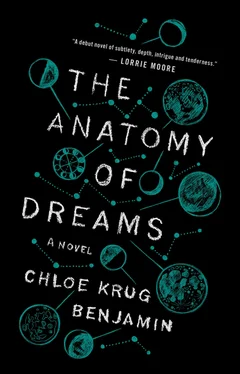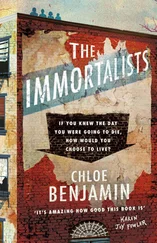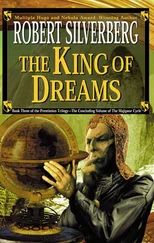“I talk, apparently.”
“But they do other things, too. They can act out their dreams, like Stu. Sometimes they hurt people—people they love.”
“What do you mean?”
“I can’t say much more now. But I can tell you that it’s good work. We give these people a way to protect themselves, control their demons. Keller helps them to turn their disorders into something useful—something powerful. C’mon, Sylvie.” Gabe grinned. “I know you’re intrigued.”
“But why me?” That question had been nagging at me. “I haven’t studied neurology. There must be people better suited for this.”
“You’re studying psych.”
“But you just learned that. It couldn’t have been why you came.”
Gabe looked down. We were steps away from my apartment now; David could have seen us if he’d looked out of the window.
“You’re right,” he said. “There were other people suited for the job. It was no small feat to convince Keller to let me try for you. But I lobbied for it, said you wouldn’t let us down. He remembered you from school. He likes using people from Mills, giving us a chance out in the real world. I know it sounds hokey, Sylve, but I think he feels like a kind of father to us.”
“To you,” I said. I could still call up the image of Gabe in the mailroom at Mills, how he would go up to the counter and ask if anything had come for him from Florida, keeping his voice low so no one else in line would listen in. In the weeks around his birthday, he made us take a detour to the mailroom twice a day, after lunch and before dinner, and I always knew whose letters he was waiting for.
Night was falling fast, the sky shedding blue, and it was difficult to see Gabe’s eyes. But with his hair so short, the structure of his jaw was more visible, and that made me remember something.
“When I saw you at the lamppost, in my dream. How could I have pictured you with short hair if you weren’t really there? If I was dreaming, why didn’t you look the way you did at Mills?”
“Hmm,” said Gabe, his head cocked. “You might have seen me in town, even if it didn’t register. I’ve been lurking around here for a few weeks, you know. Keller wanted me to make sure you were ready before I approached you. See how you were, what you were up to.”
“Some people would call that stalking. I could probably have you arrested.”
“Oh, that’s a little harsh, don’t you think?” Gabe grinned. “I was observing. I was coming to see an old friend.”
I squinted up at the window again. Where was David? On the couch, probably, where he spread out with papers and poster board each night. Sometimes I liked to work in bed with the pillows propped behind me, but for David it was always the couch, never the bed. He only used the bed to sleep.
“I would have to leave school, wouldn’t I?” I asked.
Gabe nodded.
“I’m sorry, Sylvie, but now’s when we have the opening. I’ll understand if it isn’t worth it to you, and Keller will, too. But think of it this way—you’d already have a job. A real, paying job, with benefits and a place to stay. Keller puts me up in Fort Bragg. It’s not a bad life.”
“Do you have friends?”
It sounded small, and Gabe laughed.
“Friends? No, not many. But I don’t need many friends. I have my research, which satisfies me, and Keller’s been a sort of mentor. I keep in touch with my gran; she’s still alive. And if you came with me, I’d have you.”
It was thrilling to hear him say those words. Still, I told him I needed the week to think about it and that I didn’t want him to come find me in the interim. He kept his promise. Whenever I sat down in a coffee shop or walked into a bookstore, I scanned it for him. But he was never there, and by the end of the week, I almost missed the feeling I got when I sensed he was nearby. Perhaps I was honored, or foolishly curious, or maybe I was still in love; it was probably some combination of the three that fated my decision long before it actually came time for me to make it.
It was the way I had felt when deciding whether to go to Mills. In middle school, I became resistant—I wanted to go to the public high school where my friends were going—but somehow I knew that my resistance was little more than a show. I had worn my dad’s old Mills sweatshirt since the age of eight, and I’d been hearing about the school for longer than that. The choice was mine to make, my parents said, but when I chose to go the route my father had, it seemed a choice made not by my rational mind but by the collective momentum of past experience. Later, in Keller’s psychology class at Mills—a subject I certainly wouldn’t have been able to take at the local high school, which adhered to a more limited state curriculum—I learned that Carl Jung had seen intuition as an irrational process, perception via the unconscious. I imagined intuition as an internal North Star, one that would lead me away from fairer climates of reason—if I chose to follow it.
In putting on a show of resistance, then, what had I been showing? Perhaps I meant to exert what I thought was my will, to prove I was governed by forces more logical, more solitary, than gravity or magnetism—the earth’s magic tricks. My friends would be attending the public school; therefore, I would be happy there. It was a simple equation, and like most simple equations, it probably would have been true. It would have fulfilled me, I think. But I made the decision to fulfill something else; or, as it happened, the decision made me.
When I told David that I was leaving—leaving both him and the university—he blinked at me not with sadness or anger but with absolute surprise. For a moment, I was disappointed that he didn’t react more strongly. Perhaps he had intended to break up with me, too, and was startled when I beat him to it. But if that were true, wouldn’t he have also looked relieved? There was such wonder in his face, such astonishment; it was as though I had vanished, and in my place was someone he had never seen before.
8. MADISON, WISCONSIN, 2004
The morning after Jamie’s session, I woke to thick, aggressive rain. It was nine o’clock, but it felt much earlier. The sky was a matte, slate blue, and I knew I hadn’t slept enough. Gabe was dozing with a peacefulness that irritated me, his arms curled to his chest. I pulled on an old pair of sweats and went downstairs to work in what he had dubbed my Oval Office. I couldn’t concentrate: I was still disturbed by what had happened the night before and angry that Gabe hadn’t stood up for me in front of Keller. When he woke, I wanted to talk about it again. But when I checked on him at eleven, he was still in bed. I decided I would wake him at noon, and in the meantime, I went outside to the porch.
The rain had stopped. Instead, a faint mist hung in the air. It made the world look static and grainy, like an old photograph. I sat down on the couch the former tenants had left. Time had softened the nubbly fabric, and its deep brown color hid any stains. I must have closed my eyes, because I felt myself wafting in and out of consciousness. Every so often, I came to, feeling the couch beneath me, and then I slipped away again.
“Sleepy Sylvie,” said a voice, too high to be Gabe’s. The couch gathered substance beneath me. When I opened my eyes, I saw a shadowy figure on the other side of the porch screen. Thom.
Though I knew I was awake, the quality of the light made him look like an old movie actor. I thought he was smiling at me, but I couldn’t be sure.
“Hello, you.” Thom poked his head in the door, and his features sharpened. “Didn’t mean to wake you—my apologies. Mind if I come in?”
“Sure,” I said, pushing myself into a seated position. He ducked his head beneath the door frame and dropped two large bundles on the wooden floor.
Читать дальше












